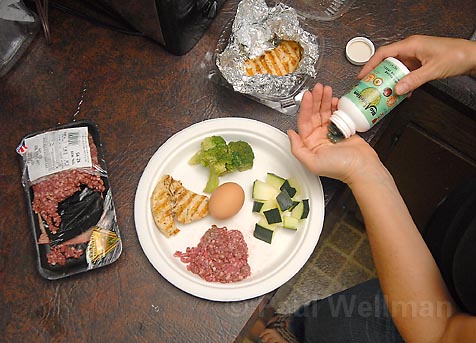An Ounce of Prevention
Helping Your Animals Stay Healthy Naturally

You know the old saying, “An ounce of prevention is worth a pound of cure”? Well, it’s true for animals as well as humans. Just as acupuncture, organic foods, dietary supplements, chiropractic care, meditation, massage, and preventative medicine are beneficial for people, so they are for your animals. The following is a list of alternative treatments that are available to help your animal maintain or regain its health.
Acupuncture
Based on the 5,000-year-old traditional Chinese medical system, acupuncture stimulates the meridians (energy pathways) of the body by inserting tiny needles into the skin along the meridian points, which unblock stagnant Qi (life force energy). Depending on symptoms, the animal usually needs two to six sessions. Has benefited: arthritis, back issues, organ dysfunction, immune system, obesity, diabetes, coughing, old age, hip dysplasia, stomach issues, allergies, fear and submissive behaviors, injury recovery, cataracts, anything diagnosed as congenital, lupus cancer, and heart conditions.
Chiropractic Care
Gentle inputs to the spine assist it in realigning itself; it works the same way for animals as humans. Animals are often much more active than humans, especially the ones running along the beach and on hilly land, so having your animal checked twice a year is a great preventative measure. An injured limb can cause a misalignment in the spine as well. One to three sessions is usually all that is necessary for an injury. Has benefited: older animals, injured animals, an animal that has become aggressive whose back is sore, overweight animals, rescue animals, high-end athletes, dachshunds, horses with lameness, cats who are high jumpers, large-breed dogs, and agility dogs.
Massage
No need to explain this one; it’s simple and works the same for animals as it does for humans. Excellent for all physical issues stated above, as well as it being a great all-around calmer.
Animal Communication
Think of it as a psychic reading for your animal. An animal communicator can help you hear the messages your pet is trying to share with you and assist you in pinpointing the root cause of your animal’s issues, be it physical, emotional, or psychological. One session will typically do the trick with perhaps one or two follow-ups down the road.
Nutrition
There are many myths perpetuated about proper diets for animals, but let’s take a common sense look at the two most important factors of what is most natural to our animal’s systems. Unless there was a time when the wolves or the mountain lions sat around a camp fire and brainstormed the idea to cook and eat dry kibble, then the traditional dry-food-only diets of today are seriously out of balance with nature.
In the wild, an animal’s diet would consist of 70-80 percent moisture. If you read the labels on dry food bags, the actual moisture content is somewhere between 10-12 percent. When there is not enough moisture in the food, the body has to pull moisture out of the cells, an unnatural process leading to dehydration. Adding water to the kibble is not the best way to get more moisture into your animal.

A dry diet is the most unnatural for cats as they are strict carnivores; not only do they need fresh meat, but they need the water content from that meat as they were not designed to be big water drinkers. I am convinced dehydration is a major contributing factor to kidney disease in cats as they get older. My recommendation is a ratio of at least 50 percent wet, 50 percent dry at a minimum, and 65 percent wet and 35 percent in most cases. (Remember to switch over during a 10-day period so as not to upset your animal’s stomach.)
I am a big believer in “human food for animals.” Animals 40 years ago didn’t have anywhere near the incidence of diseases that we see today, and guess what they ate-table scraps. You will be amazed at the differences you notice: healthier coat, more relaxed animal, clearer eyes, better teeth, and more energy.
As for water, tap water has chlorine and fluoride in it, two completely unnatural chemical additives that would never be found in the wild. Spring water or filtered water that eliminates those two chemicals is best for our animals.

Any time food is cooked past 118 degrees, as is the case with kibble, all of the enzymes in the food are killed off. The body, animal or human, needs enzymes for healthy digestion and absorption; in fact, many illnesses such as irritable bowel, acid reflux, allergies, cancers, arthritis, auto immune diseases, and poor absorption of food are being traced to low-enzyme counts.
In the wild, when a predator takes down its prey, the first thing it eats is the stomach because that’s where the most concentration of enzymes are, which are necessary for the predator to have in order to break down the rest of the meat it will consume.
Supplements
The one supplement I would recommend as a given is a high-quality enzyme supplement that any animal older than two years old should receive with each meal.
Alecia Evans is a professional animal wellness consultant, communicator, and dog trainer. She can be reached at allbeingsequal@hotmail.com, at www.allbeingsequal.com or at Dioji K-9 Resort & Athletic Club in Santa Barbara for animal wellness consultations.



